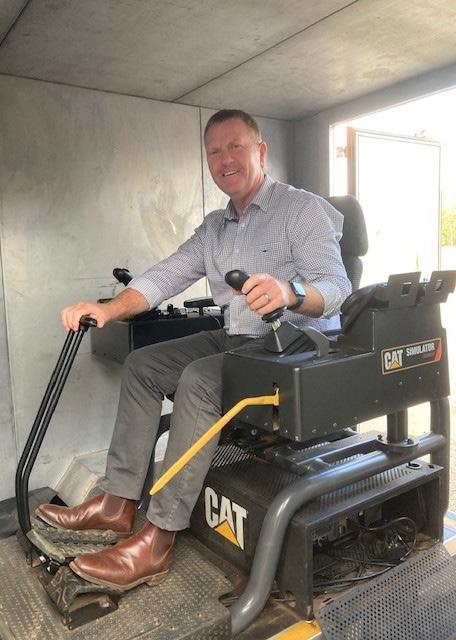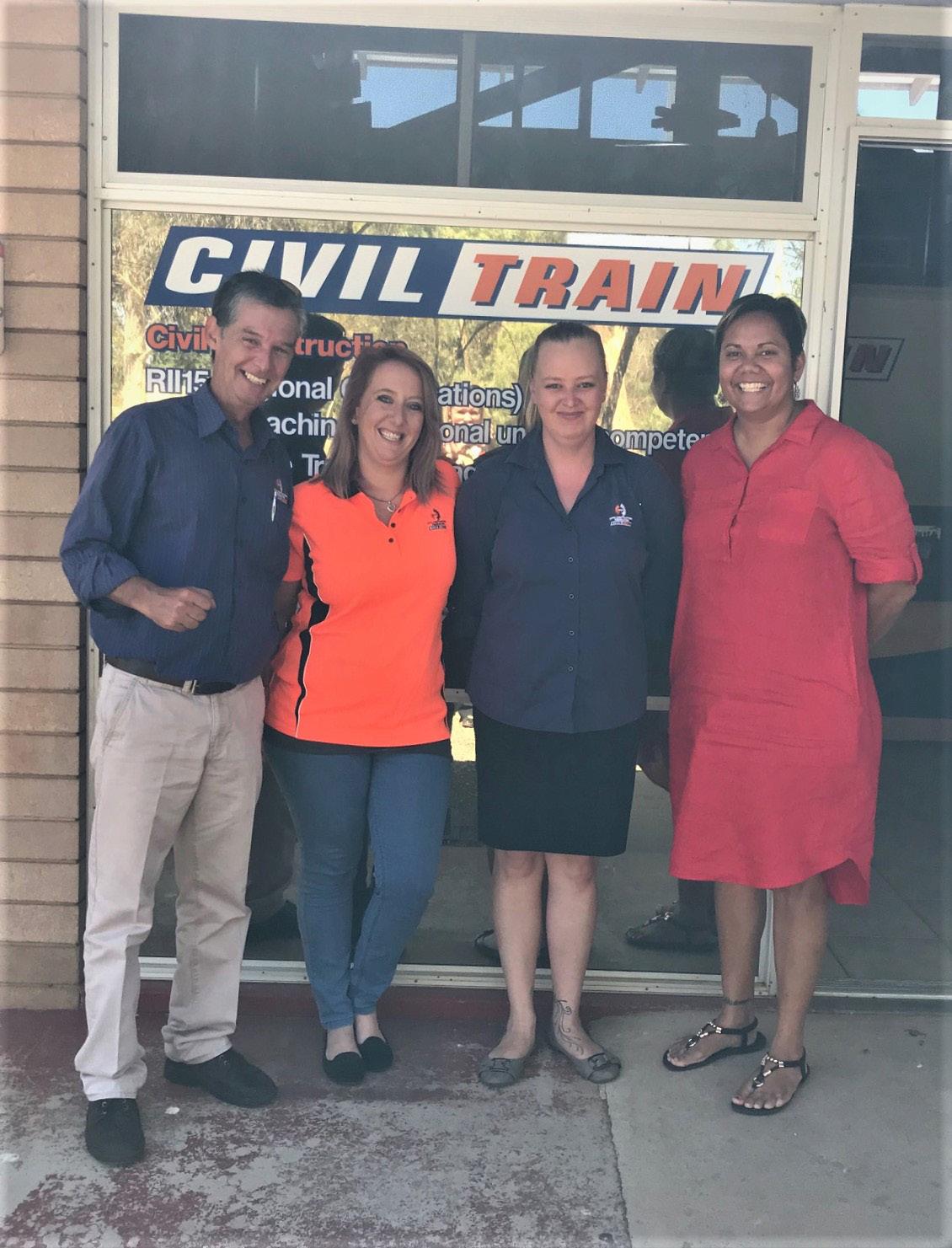
6 minute read
CAPACITY BUILDING
REGIONAL/REMOTE NORTHERN TERRITORY (NT)
Written by Mark Hopkins, Civil Train NT
Government and industry working as one!
Civil Train NT is now the key provider of WHS training services for a number of sectors throughout Central Australia. However, in relation to achieving tangible, meaningful results leading to a safe, productive workforce in remote NT, partnerships and alliances need to be established and supported. While it can take time to manifest, the results will justify the endeavour.
I personally became involved with the indigenous peoples of Central Australia and the NT Government when I was asked to provide a series of white card programs in remote communities throughout the Central Australia region (when new national accreditation became a requirement) in connection with the Strategic Indigenous Housing and Infrastructure Program (SIHIP) 2010. It was during this period that I realised simply providing short training courses in Alice Springs would not address the numerous safety issues, plant damages, skills shortages, lack of tools and equipment, inadequate roads and infrastructure etc, I witnessed in the numerous communities I visited. This is where Civil Train and the CCF stepped in. The concept of taking action to deliver training programs, including the use of plant simulators to remote communities, was designed, developed, and initiated. In Civil Train’s 12 years of operations in the Northern Territory (predominantly Central Australia), no collaboration has been more significant or instrumental in relation to the outcomes we have achieved when working with First Nations People, than that of Civil Train NT and the Department of Industry, Tourism and Trade, Northern Territory Government. As a not-for-profit industry RTO, it makes sense to be working in unison with the NT Government with a synergistic focus on upskilling and accrediting a potential local workforce, benefiting all involved, especially in relation to improving remote infrastructure and the living standards for indigenous people throughout the Northern Territory.
Connecting regional centres to regional employment
From a humble beginning (based at Olive Pink Botanic Garden) using a renovated bathroom as an office, the concept of hands-on practical training involving unemployed individuals from all cultures, and linking to local employment opportunities (industry), whilst also improving and/ or repairing the infrastructure of various community settings, became a reality. Numerous pre-employment programs involving heavy machinery, hand and power tools, small plant and equipment etc, were facilitated over a three-year period. From evaluations and result records, an average of 60% employment outcomes were achieved by working with our various partners at the time – Jobfind, My Pathways, and Salvation Army, amongst others. All these programs mentioned were funded and supported by the Department of Industry, Tourism and Trade (then named Department of Business and Employment).
Connecting remote communities to remote employment
Our cross-cultural inclusive training programs were then established and evaluated. However, taking the initiative to more remote areas would prove to be a far more challenging endeavour than first anticipated. It is not unusual to have to deal with a number of organisations, all with their own schedules, itineraries, and agendas, in order to deliver a simple training course. And that is without even mentioning all the inherent logistical and cultural challenges involved. Despite these difficulties, and again with the support of the Department of Industry, Tourism and Trade (then Department of Trade, Business and Innovation), Civil Train NT/CCFSA embarked on what is, to this day, arguably the most successful, efficient, and productive civil construction remote training and assessment service within the NT.
Our primary training service (demand) in remote NT locations is plant operations (of heavy machinery), as this high-risk activity is not only extremely dangerous with significant duty of care obligations, it is also extremely expensive in relation to plant servicing (associated with the risk of incurring repair costs from damages), and transportation etc. This certification has been a major pathway to employment opportunities outside of a given community eg civil roadworks, mining activities etc. Increasingly, there is also the requirement for basic (relevant) skillsets to be acquired in communities. These skills generally relate to the use of hand and power tools, as well as small plant and equipment involving welding, fencing, concreting, landscaping, community beautification projects etc. Again, these skillsets have proven to be a conduit to various forms of employment, with people who have been trained taking advantage of opportunities when they appear in housing projects, local infrastructure work, and even inclement weather conditions! So, it’s far from training for training’s sake!
To date, we have not received any report of workplace incidents or serious accidents concerning the countless remote programs facilitated by Civil Train NT. Over the years, the feedback from employers and the NT Government has always been positive and supportive. It is all validated by the reactions of many past participants when describing their employment and plans for the future. They reveal a real sense of pride and accomplishment, usually followed by repeated ‘Thank You!’
Setbacks and bounce backs!
As with all organisations, internal structures, future plans and projections were severely curtailed by the COVID-19 pandemic. Government departments and the not-for-profit training sector were by no means immune to these challenges, with major staff shortages and various systems failing. During this time of insecurity and uncertainty, Civil Train NT, with the support of the NT Government, managed to continue providing vital training services to many individuals, aiding in maintaining a safe and productive workforce for various sectors and organisations including civil and general construction, mining, and essential services. All that happened whilst The Department of Industry, Tourism and Trade was busy restaffing and restructuring their internal systems/ policies and procedures. And with Civil Train NT hard at work relocating to the Desert Knowledge Precinct, forming new partnerships and opportunities. Again, this highlights the resilience and commitment formed by this alliance.
Looking forward
In anticipation of a substantial increase in employment opportunities within Central Australia, the demand for local skilled labour will intensify significantly over the next five years.

Updated (Local) preemployment programs are currently in the planning process, to be delivered at the Desert Knowledge Precinct (DKP) involving several organisations, including the Centre of Appropriate Technology, various employment services, Indigenous corporations, and councils, putting forward potential candidates to participate in industry-linked, accredited training programs.
Civil Train’s engagement with remote Indigenous communities continues to grow from strength to strength. We are currently working with a number of highly motivated and professional organisations on various programs and services, including Central Desert Regional Council (CDP & Services), Central Land Council (Ranger program), Urapuntja Aboriginal Corporation (Homeland services), and Tangentyere Council (regional and remote services). Most recently, the MacDonnell Regional Council provided valuable assistance we requested for our training programs. Like many others in the past, in one form or another, they were funded, observed and supported by the Department of Industry, Tourism and Trade.
Our public short training courses in Alice Springs is also increasing dramatically. This is predominantly due to a blend of the above programs, and the private and public sectors facilitating the consistency, reliability and flexibility required to sustain a permanent industry standard of training and accreditation within Central Australia.
Everyone at Civil Train is fully aware nothing should be assumed or taken for granted. Federal, State and Territory Governments and Departments will continue to evolve, restructure and develop policies and guidelines, depending on current needs and priorities. I am, however, confident the enduring and successful collaboration between Civil Train NT and the various NT Government Departments (including, Education, Defence, Local Councils, Corrections, and Healthcare) will continue to provide relevant, appropriate, practical skills and accreditation to all Territorians for the foreseeable future, and the connection and relationships formed with so many indigenous communities will remain intact and productive.
Civil Train NT and CCF SA would like to take this opportunity to thank all the individuals involved in the various programs mentioned and reiterate our appreciation in relation to the trust and respect we have been afforded both by the NT Government and private sector.
LETTERS OF SUPPORT*
The uncompromised quality but also the adaptability to get the job done coming from Civil Train has resulted in a higher level of expected professionalism and capabilities of our ranger staff. Having CLC remote ranger staff skilled to use civil machinery increases the ability of staff to complete more activities independently in their communities, giving benefits to remote communities more broadly.

Jack Nugent – Ranger Workforce Development Officer
Central Land Council
Civil Train has provided a variety of tailored, training courses that have assisted jobseekers and staff to complete accredited training. Civil Train has delivered these training courses in remote communities in a manner that is professional, respectful and supportive of participants.

Leslie Manda – Chief Executive Officer Central Desert Regional Council
One of key tenants of our success is the flexibility
Civil Train has been able to demonstrate over the years allowing us to utilise short notice blocks of time where the crew have not been able to deploy to complete training objectives.
Martin Glass – Managing Director GreenGlass
From this training, many of our job seekers have successfully obtained ongoing employment and/or further training to support and enhance their skill set in their chosen industry. A high number of employers/ businesses whom TES has ongoing positive stakeholder relationships with are also appreciative of this collaborative approach (Gov and Industry) and encourage ongoing initiatives of this nature. TES looks forward to continuing to work with them in the future.
Dee McCorkindale – Employment and Training Manager Tangentyere Employment Services
*Extracted from a selection of letters of support









